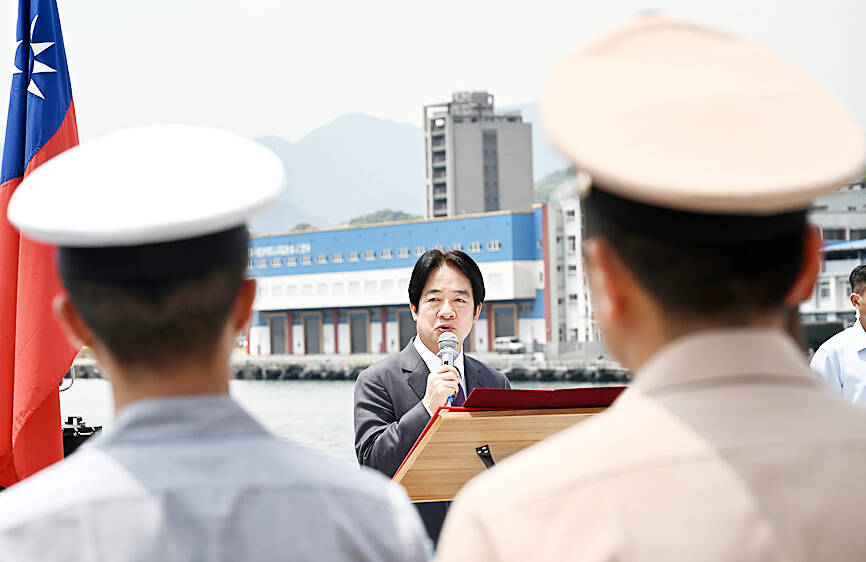The Ministry of National Defense yesterday said it was monitoring “waves” of missile tests in China’s Inner Mongolia and that its air defense forces were on alert.
From 4am yesterday, the ministry detected “multiple waves of test launches” by the Chinese People’s Liberation Army (PLA) Rocket Force in Inner Mongolia, about 2,000km from Taiwan, it said.
The military are continuously monitoring developments and the air defense forces are on alert, the ministry said, without giving details.

Photo: Lo Pei-de, Taipei Times
The Chinese Ministry of National Defense did not answer calls seeking comment outside of office hours. The Rocket Force is in charge of China’s conventional and nuclear missile arsenal.
The tests come as two Russian warships arrived in the southern Chinese port city of Zhanjiang for joint naval exercises, the first phase of which is to begin tomorrow, the Russian Ministry of Defense said yesterday.
In August 2022, China fired missiles into the waters around Taiwan during war games to express anger at a visit to Taipei by then-US House of Representatives speaker Nancy Pelosi.
Taiwan operates powerful radar stations on some of the peaks of the Central Mountain Range that can look far into China, security sources said.
Beijing has increased its military pressure on Taiwan, including war games, since the May 20 inauguration of President William Lai (賴清德), who it refers to as a “separatist.”
Lai has repeatedly offered to hold talks with China, but has been rebuffed.
Lai yesterday inspected the Weihai Naval Base (威海營區) at the Port of Keelung, home to the nation’s 131st Fleet and its indigenously built Tuo Jiang-class corvettes.
Addressing the fleet, Lai said it is charged with the important tasks of patrolling waters to the south and northeast of Taiwan and escorting transports to outlying islands.
The fleet is also an important pillar of the military’s asymmetric warfare capabilities, he said, adding that he hopes they would continue to uphold the navy’s spirit of loyalty and righteousness, and protect the country’s coasts and territorial waters.
The high-efficiency Tuo Jiang-class stealth corvettes stationed at the base have helped to bolster national security and represent the cross-section of Taiwan’s ongoing projects to build warships domestically, he said.
In his address, Lai referred to a project to relocate military harbors at the naval base port westward, which entails building new offices and dormitories for military personnel.
The project is expected not only to significantly improve their living conditions, but also boost national defense and the development of Keelung, he said.
Lai also gave the fleet a monetary reward meant to boost morale.
Additional reporting by AFP

CHAOS: Iranians took to the streets playing celebratory music after reports of Khamenei’s death on Saturday, while mourners also gathered in Tehran yesterday Iranian Supreme Leader Ayatollah Ali Khamenei was killed in a major attack on Iran launched by Israel and the US, throwing the future of the Islamic republic into doubt and raising the risk of regional instability. Iranian state television and the state-run IRNA news agency announced the 86-year-old’s death early yesterday. US President Donald Trump said it gave Iranians their “greatest chance” to “take back” their country. The announcements came after a joint US and Israeli aerial bombardment that targeted Iranian military and governmental sites. Trump said the “heavy and pinpoint bombing” would continue through the week or as long

TRUST: The KMT said it respected the US’ timing and considerations, and hoped it would continue to honor its commitments to helping Taiwan bolster its defenses and deterrence US President Donald Trump is delaying a multibillion-dollar arms sale to Taiwan to ensure his visit to Beijing is successful, a New York Times report said. The weapons sales package has stalled in the US Department of State, the report said, citing US officials it did not identify. The White House has told agencies not to push forward ahead of Trump’s meeting with Chinese President Xi Jinping (習近平), it said. The two last month held a phone call to discuss trade and geopolitical flashpoints ahead of the summit. Xi raised the Taiwan issue and urged the US to handle arms sales to

State-run CPC Corp, Taiwan (CPC, 台灣中油) yesterday said that it had confirmed on Saturday night with its liquefied natural gas (LNG) and crude oil suppliers that shipments are proceeding as scheduled and that domestic supplies remain unaffected. The CPC yesterday announced the gasoline and diesel prices will rise by NT$0.2 and NT$0.4 per liter, respectively, starting Monday, citing Middle East tensions and blizzards in the eastern United States. CPC also iterated it has been reducing the proportion of crude oil imports from the Middle East and diversifying its supply sources in the past few years in response to geopolitical risks, expanding

Pro-democracy media tycoon Jimmy Lai’s (黎智英) fraud conviction and prison sentence were yesterday overturned by a Hong Kong court, in a surprise legal decision that comes soon after Lai was jailed for 20 years on a separate national security charge. Judges Jeremy Poon (潘兆初), Anthea Pang (彭寶琴) and Derek Pang (彭偉昌) said in the judgement that they allowed the appeal from Lai, and another defendant in the case, to proceed, as a lower court judge had “erred.” “The Court of Appeal gave them leave to appeal against their conviction, allowed their appeals, quashed the convictions and set aside the sentences,” the judges